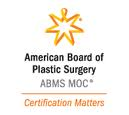The public is widely aware of the benefits of having their plastic surgeon board-certified. There is probably no other surgical specialty than plastic surgery where this is of greater importance. This is because a significant and highly visible component of plastic surgery, cosmetic procedures of the face and body, is mostly practiced outside of oversight from hospitals and medical organizations. The economics of cosmetic surgery and other factors dictate that it is done through the doctor’s office or private surgery centers. As many doctors of various training backgrounds have embarked on performing cosmetic surgery, often with limited training, patients need to know that their plastic surgeon is adequately trained.


As a board-certified plastic surgeon, I was initially put off by both time-limited certificates and the Maintenance of Certification (MOC) Program. Both seemed onerous and unnecessary and a general interference with trying to run a busy practice and taking care of patients. I felt this was particularly true of the MOC process with its more frequent requirements. But having been through the process now for several years, I have come to realize that its benefits far outweigh the perceived time inconveniences that it involves.
As well described in Geoff Colvin’s book ‘Talent Is Overrated’, top performers in any endeavor in life take time to periodically review the basic educational cornerstones of their particular profession. Our memories in life are short and it is easy to forget basic principles not to mention new insights and advancements in various fields. While some may have the discipline to do basic education on a regular basis, and many plastic surgeons do, the MOC program provides a structured and documented method to do it. When combined with the online learning available at the Plastic Surgery Educational Network (PSEN) of the American Society of Plastic Surgery, the ability to pursue regular education and to stay as competent as possible is easier than ever before.
When looking for a plastic surgery specialist, board certification and the MOC-PS mark indicate that they are doing their best to stay abreast of the high educational standards that separates this specialty from many other practitioners who many perform similar procedures.
Dr. Barry Eppley
Indianapolis, Indiana


